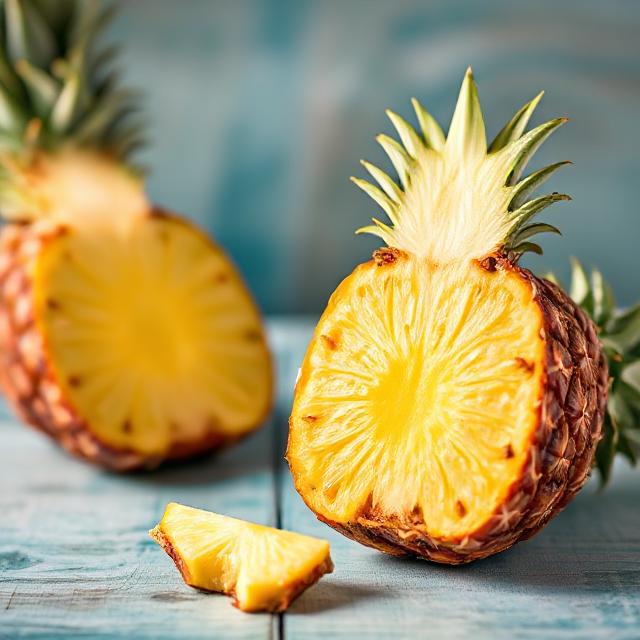Introduction
Sweet, juicy, and bursting with tropical flavor, pineapple isn’t just a summer indulgence—it’s one of nature’s most powerful sources of nutrition. Behind its golden flesh lies a rich blend of vitamins, minerals, and enzymes that can make a real difference in how you feel. Whether enjoyed fresh, blended into smoothies, or grilled for dessert, this tropical fruit offers benefits that reach far beyond its refreshing taste.
In this article, we’ll dive deep into the health benefits of pineapple, exploring how its nutritional profile, unique enzyme content (especially bromelain), and versatile culinary uses can support your body—from immune function to digestion, from heart health to skin glow. If you’re looking to make pineapple a smart part of your wellness routine, you’re in the right place.

H2 – What Makes Pineapple So Nutritious?
H3 – Key nutrients in pineapple
The fruit we know as pineapple (Pineapple) is packed with several important nutrients:
- Rich in vitamin C: This supports immune defence, collagen formation, and antioxidant activity. (Cleveland Clinic)
- Excellent source of manganese: One cup of pineapple chunks supplies over 100 % of the recommended daily amount in some reports. (Cleveland Clinic)
- Good amount of dietary fiber, several B-vitamins, and essential minerals such as copper, potassium and magnesium. (Cleveland Clinic)
- Contains the enzyme bromelain, which has unique properties for digestion and inflammation. (WebMD)
H3 – What the research says
Scientific reviews confirm that pineapple is more than just a sweet snack. A comprehensive review noted its “various health benefits, including anti-inflammatory, antioxidant activity, monitoring nervous system function, and healing bowel movement.” Other research found that pineapple intake reduced markers of oxidative stress and improved vascular function in animal models. While not all claims are proven in humans, the evidence is promising, and pineapple’s nutrient density alone means it makes a very smart dietary choice.
H2 – Health Benefits of Pineapple
H3 – 1. Immune-Boosting Power
One of the standout benefits of pineapple is its ability to support the immune system. With high levels of vitamin C and flavonoids, pineapple helps protect cells from oxidative damage and supports collagen production (which is important for skin and tissues).
In one study, children who ate pineapple daily had fewer viral and bacterial infections and faster recovery times.
Key takeaways:
- A cup of pineapple may provide around one-third of your daily vitamin C needs.
- The combination of vitamin C + other antioxidants supports immune resilience.
H3 – 2. Digestion Support & Gut Health
If you’ve ever noticed pineapple seems to “cut through” heavy meals, there’s a reason: it contains bromelain, a mixture of enzymes that help break down protein. (WebMD)
Additionally, its fiber content supports digestive regularity. Some specific benefits:
- Bromelain may ease the digestion of meat and protein-rich foods. (Medical News Today)
- Fiber helps maintain healthy bowel movement and supports gut-friendly bacteria. (Cleveland Clinic)
- Some preliminary studies show pineapple can reduce gut inflammation and support a healthy lining. (Verywell Health)
H3 – 3. Anti-Inflammatory & Joint Health
Chronic inflammation is a root cause of many conditions—arthritis, cardiovascular disease, etc. Pineapple’s bromelain enzyme and its antioxidant compounds have shown anti-inflammatory effects. (Cleveland Clinic)
For example:
- Bromelain may ease symptoms of osteoarthritis by reducing joint pain and swelling. (WebMD)
- Animal studies show pineapple intake attenuated oxidative stress in the heart under a high-cholesterol diet. (PMC)
While human trials are still limited, adding pineapple as part of an anti-inflammatory diet is a smart move.
H3 – 4. Heart & Circulatory Support
Heart health benefits of pineapple occur via multiple pathways: nutrient support (manganese, potassium), antioxidant activity, and potential lipid-lowering.
- One rodent study found that pineapple reduced cholesterol and triglycerides in the liver and blood. (
- Its antioxidants may protect arteries from oxidative damage and improve vascular function.
- Potassium in pineapple helps regulate blood pressure and fluid balance.
While we shouldn’t treat pineapple as a cure-all for heart disease, its components support cardiovascular wellness when combined with a healthy lifestyle.
H3 – 5. Skin, Bone & Skin Tissue Health
Pineapple supports tissues in multiple ways:
- Vitamin C aids the production of collagen—crucial for skin strength and elasticity.
- Manganese supports bone formation and connective tissue.
- Its antioxidant power shields skin from sun and pollution damage and supports a clear complexion.
Eating pineapple regularly (as part of a varied diet) helps your skin, bones and overall tissue structure.
H3 – 6. Weight Management & Satiety
Though pineapple isn’t a magic “fat-burner,” it contributes to a weight-friendly diet because:
- It is relatively low in calories but high in water and fiber → supports fullness.
- Some studies show that its bromelain and fiber may promote better fat metabolism in animals.
In short, pineapple is a smart dessert or snack option if you’re watching energy intake and want nutrient-rich satisfaction.
H2 – How to Enjoy Pineapple for Maximum Benefits
H3 – Choosing and storing pineapple
- Select a pineapple with a sweet aroma at the base, firm skin, and a bright golden-yellow color.
- To ripen a green-tipped pineapple faster, place it in a paper bag with a ripe banana (ethylene gas helps ripening).
- Store whole in the fridge for up to 3–5 days; once cut, keep in an airtight container and use within a few days.
H3 – Ways to eat it
- Fresh: Simply cut into chunks and enjoy as a snack.
- Smoothies: Blend pineapple with yogurt or milk for a tropical touch.
- Grilled or roasted: Caramelizes the natural sugars and adds depth of flavor.
- Add to savory dishes: Pineapple salsa, grilled chicken with pineapple, tropical salad.
- Juice: Pineapple juice has benefits, but note that enzyme levels drop in canned or heavily processed forms.
H3 – Serving recommendations
- One cup (≈165 g) of pineapple chunks provides ~75 calories, no fat, and a solid range of vitamins and minerals.
- If you’re aiming for the enzyme/bromelain benefit: choose fresh, uncooked pineapple, rather than heavily heated or canned forms (heat can degrade enzymes).
- Pair pineapple with a protein (e.g., Greek yogurt, cottage cheese) to balance sugars and improve satiety.
H2 – Precautions & Considerations
H3 – Acidic nature & oral health
Pineapple is slightly acidic, and excessive consumption may irritate the mouth or contribute to tooth enamel wear. Rinse your mouth or drink water afterward.
H3 – Allergies and bromelain sensitivity
Some people may be sensitive to bromelain or pineapple proteins and experience itching, hives or swelling. If you develop these reactions, avoid pineapple and consult your healthcare provider.
H3 – Medication interactions & health conditions
- Potassium content: If you have kidney disease or take potassium-sparing medications, monitor intake.
- Bromelain may increase bleeding risk or interact with anticoagulant medications—if you’re on such medications, talk to your doctor before consuming high doses or supplements.
- High sugar fruit: Though pineapple is healthy, it still contains natural sugars — balance it within your overall carbohydrate intake, especially if you have diabetes.
H3 – Not a standalone cure
While pineapple offers many supportive benefits (digestion, inflammation, antioxidant), it’s not a substitute for medical treatments, nor does it guarantee prevention of disease. As research notes: “More research is needed.”

H2 – Real-World Examples & Practical Tips
- Add pineapple chunks to your morning oatmeal: This adds flavor, fiber, and nutrients without needing added sugar.
- Post-workout smoothie: Blend frozen pineapple, banana, spinach, a scoop of protein powder, and unsweetened almond milk. The bromelain may support recovery, and the vitamin C helps repair.
- Grilled pineapple dessert: Slice thick rings, grill lightly, and serve with a dollop of Greek yogurt and a sprinkle of toasted coconut.
- Tropical salsa: Dice pineapple, red pepper, cilantro, red onion, lime juice — serve over black beans or grilled fish for a nutrient-rich, flavor-packed meal.
Conclusion
Pineapple isn’t just a delicious tropical treat—it’s a nutrition powerhouse. From immune support and digestion help to anti-inflammatory effects, bone and skin health, and even potential heart benefits, the many health benefits of pineapple make it a worthy addition to your diet. Remember to enjoy it fresh when possible, pair it with protein or fiber, and integrate it as part of a balanced lifestyle for best results.
Ready to add more pineapple to your life? Try this week: pick up a fresh pineapple, freeze some chunks for smoothies, and grill a slice as a sweet treat. Share your favorite pineapple recipe or how you feel after adding it—let’s turn that tropical flavor into real wellness!


